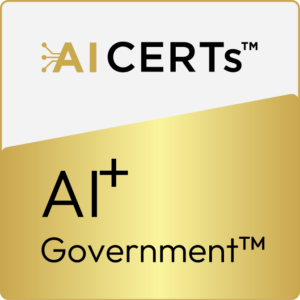- modules: 8
- Examination: 1
- Examination Time: 50 MCQs, 90 Minutes
- Passing Score: 70%
About Certification
The AI+ Government Certification course offers a thorough exploration of how AI technologies can elevate governmental operations. This comprehensive program covers theoretical foundations and practical applications, including Data Management algorithms, ICT Techniques, and AI Strategies within policy frameworks tailored to governmental needs. Participants delve into ethical and regulatory considerations surrounding AI implementation in the public sector, ensuring responsible deployment. Through lectures, case studies, and hands-on exercises, participants master designing AI-driven solutions for tasks from data analysis to policy formulation. By course end, participants are adept at leveraging AI's transformative potential in government settings, promoting efficiency, transparency, and innovation to better serve citizens and tackle societal challenges.
Prerequisites
- Basic familiarity with AI fundamentals, without the need for technical expertise.
- Keen interest in understanding how AI can be strategically integrated into governmental processes.
- Readiness to think innovatively and generate ideas is essential for effectively utilizing AI tools within governmental operations.
Certification Modules
- 1.1 Overview of AI Concepts and Applications in Government
- 1.2 Historical Perspective and Evolution of AI in Public Sector
- 1.3 Importance of AI in Government
- 1.4 Role of AI in Addressing Governmental Challenges
- 1.5 Ethical Considerations and Responsible AI Practices
- 1.6 Real-World Case Studies
- 2.1 Regulatory Landscape for AI in Government
- 2.2 Formulating AI Strategies Aligned with Government Objectives
- 2.3 Public-Private Partnerships
- 2.4 International Policy Frameworks
- 2.5 Compliance, Privacy, and Security Considerations
- 3.1 Data Collection, Storage, and Processing Using AI Techniques
- 3.2 Data Quality and Bias Mitigation
- 3.3 Data Privacy Regulations and Compliance
- 3.4 Data Lifecycle Management in Government Agencies
- 3.5 Data Quality Assurance and Governance Frameworks
- 3.6 Data Sharing Protocols and Interoperability Standards
- 4.1 Personalized Learning Platforms and Adaptive Assessment Tools
- 4.2 AI-enabled Tutoring Systems and Educational Content Recommendation
- 4.3 Addressing Equity and Accessibility Challenges in AI-driven Education
- 4.4 Implementation of ICT Techniques in Teaching Learning System for Officials
- 4.5 Inclusive and Accessible AI Solutions
- 5.1 Predictive Policing, Crime Mapping, and Threat Detection Using AI
- 5.2 Disaster Response, Public Health and Emergency Management with AI Technologies
- 5.3 Privacy Concerns and Ethical Considerations in AI-powered Security Systems
- 5.4 AI in Forensic Investigations
- 6.1 Enhancing Citizen Engagement and Service Delivery with AI
- 6.2 Chatbots, Virtual Assistants, and Personalized Recommendations
- 6.3 Designing AI-driven Interfaces Exclusively for Those with Disabilities in Using Government Portals and Applications
- 6.4 AI Platforms to Direct the Common Man to Reach the Officials
- 6.5 AI-driven Quick Response System for Those with Disabilities with SoS Model
- 7.1 Planning and Executing AI Projects in Government Agencies
- 7.2 Legacy System Modernization
- 7.3 Integration with Existing Systems and Workflows
- 7.4 Case studies of AI Applications in Various Government Sectors (e.g., Healthcare, Transportation, Public Safety)
- 7.5 Best Practices for Implementing AI Projects in Government
- 8.1 Developing an AI Strategy for Government Organizations
- 8.2 Emerging Trends in AI and Their Potential Impact on Government Services
- 8.3 Exploring Cutting-edge AI Research and Innovations in Government Sectors
- 8.4 Impact of Emerging Technologies (e.g., AIoT, Quantum Computing) on Government Services and Societal Benefits
- 8.5 Continuous Learning, Adaptation and Sustainability in Technological Advancements in the AI Field
Certification outcome
Upon successful completion of the AI+ Government certification, participants will be equipped to validate their competency in specific AI areas relevant to governmental operations. This includes applying AI techniques to solve government-related issues and grasping the ethical and policy implications of AI in this context. Participants will demonstrate the capability to implement real-time solutions within government organizations, ensuring a seamless experience for citizens. They'll understand the ethical considerations of automating manual government transactions and the challenges involved. Moreover, they'll optimize tasks and accelerate clerical and administrative processes within governmental bodies, fostering efficiency and effectiveness in public service delivery.











